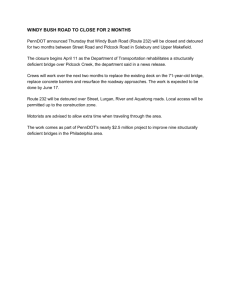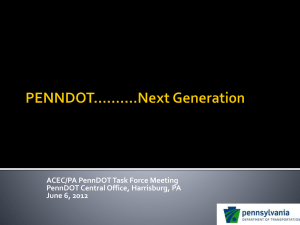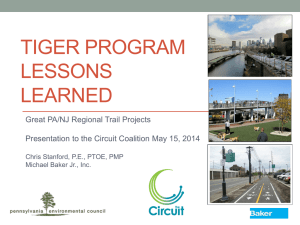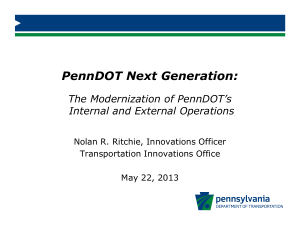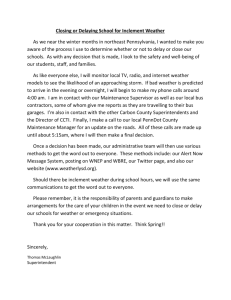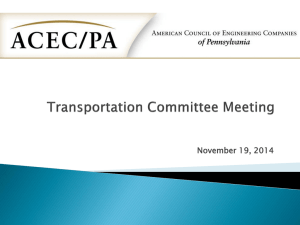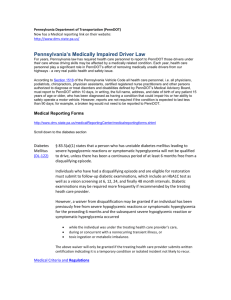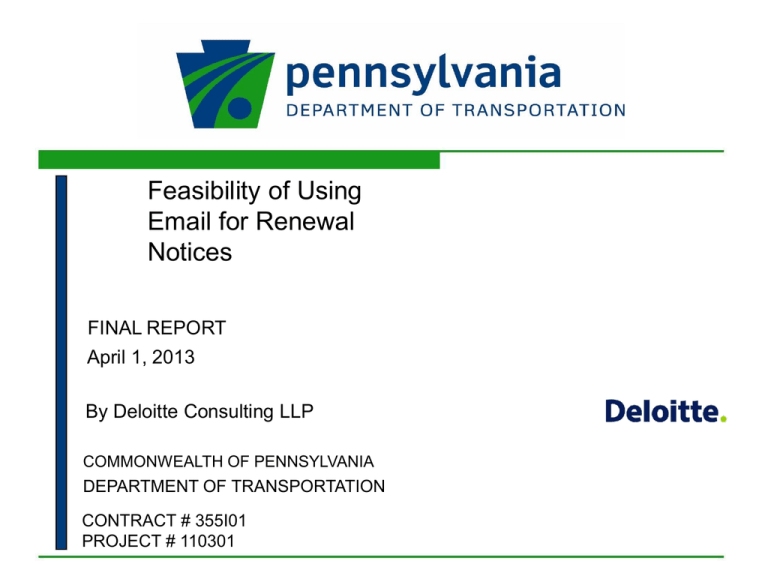
Feasibility of Using
Email for Renewal
Notices
FINAL REPORT
April 1, 2013
By Deloitte Consulting LLP
COMMONWEALTH OF PENNSYLVANIA
DEPARTMENT OF TRANSPORTATION
CONTRACT # 355I01
PROJECT # 110301
Technical Report Documentation Page
1. Report No.
2. Government Accession No.
3. Recipient’s Catalog No.
PA-2013-001-110301
4. Title and Subtitle
5. Report Date
April 1, 2013
Feasibility of Using Email for Renewal Notices
6. Performing Organization Code
Final Report
7. Author(s)
Art Stephens, Jim Templeton, Deb Ferreira
8. Performing Organization Report No.
9. Performing Organization Name and Address
Deloitte Consulting LLP
300 Corporate Center Drive
Camp Hill, PA 17011
10. Work Unit No. (TRAIS)
11. Contract or Grant No.
355I01 - 110301
12. Sponsoring Agency Name and Address
13. Type of Report and Period Covered
The Pennsylvania Department of Transportation
Bureau of Planning and Research
Commonwealth Keystone Building
400 North Street, 6th Floor
Harrisburg, PA 17120-0064
Final Report: November 1, 2012 – April 30,
2013
14. Sponsoring Agency Code
15. Supplementary Notes
16. Abstract
The Pennsylvania Department of Transportation (PennDOT) has contracted with Deloitte to conduct a feasibility study to
analyze the use of Email for renewal notices for driver license and vehicle registration renewals. The Final Report provides
an overview of the key findings identified in the Best Practices Analysis and Cost Benefit Analysis deliverables.
17. Key Words
Best Practices
18. Distribution Statement
No restrictions. This document is available
from the National Technical Information
Service, Springfield, VA 22161
Cost Benefit Analysis
Email for Renewals
Feasibility Study
19. Security Classif. (of this report)
20. Security Classif. (of this page)
Unclassified
Unclassified
Form DOT F 1700.7
(8-72)
21. No. of Pages
22. Price
N/A
Reproduction of completed page authorized
Feasibility of Using Email for Renewal Notices
Final Report
Deloitte Consulting LLP
April 1, 2013
Table of Contents
Key Findings in Brief
5
Approach
9
Best Practices Report
11
Cost Benefit Report
27
Other Considerations
32
Appendices
34
Appendix A—AAMVA Survey Questions and Respondents
35
Appendix B—Market Research Key Findings
38
Key Findings in Brief
Approach
Best Practices
Report
Summary of
Best Practices
Cost Benefit
Report
Other
Considerations
Appendices
Copyright © 2013 Deloitte Development LLC. All rights reserved.
Key Findings in Brief
Email Feasibility Study
Key Findings in Brief
Implementing an email reminder program in PA may result in cost savings for vehicle
registration reminders while being perceived by customers as improved service
More Financial Reward for
Vehicle Registration Renewals
More states offer electronic reminders for vehicle registration than driver license renewal. For PA,
the cost benefit for vehicle registration electronic reminders is more favorable than driver license
reminders.
Improved Customer Service
and Potential for Cost Savings
Some states such as Virginia, Maryland and Indiana, have a mature electronic notification program
and have identified improved customer service as an intangible benefit. The potential for actual cost
savings from implementing an email reminder program will depend on decisions regarding how the
program is implemented.
Customer Adoption Rate
States are experiencing growing adoption of online services for vehicle registration and driver
license renewals.
Master Contracts and 3rd Party
Service Contractors
Some states such as Indiana are utilizing master email service contracts and 3rd party contractors to
assist with the implementation of the program.
Spam Concerns
Email reminders can be identified as spam. Some states have had success reducing spam potential
through collaboration with Internet Service Providers (ISPs ) to avoid spam blockage. For example,
Virginia and Maryland reported email delivery rates of 98% and 90-95%, respectively.
-6-
Copyright © 2013 Deloitte Development LLC. All rights reserved.
Summary of Best Practices
Strategies around spam prevention, email verification and working with ISPs were
some of the best practices identified
Engage Legal
Engage “legal” in the early stages of the program to ensure the appropriate language is included in
customer agreements describing the service, customer responsibilities and that legal protocols are
being followed.
Leverage Opt-in Terms and
Conditions
Citizens that “opt-in” should be required to accept the terms and conditions of the agreement
(example conditions could be: receive email reminder only, notify PennDOT of email address
change, add PennDOT email address to safe sender list, renew credential electronically).
Consider Master Contracts
If using master contracts for email providers is considered, consider teaming with other
Pennsylvania agencies or other states’ agencies to achieve cost reductions based on economies
of scale.
Reduce Email Spam Filter
Scenarios
Work closely with Internet Service Providers to reduce the likelihood that email reminders will be
deemed spam and delivery stopped.
Verify Email Addresses
Upfront and Periodically
Require customers to enter email address information twice when signing up for the service as it
will increase the accuracy of the address.
Consider approaches to periodically use or test email addresses (e.g., semi-annually) to verify the
address is still valid.
-7-
Copyright © 2013 Deloitte Development LLC. All rights reserved.
Summary of Best Practices
Other best practices include PII implications, 3rd party contracting, and understanding
the customer base prior to implementation
Consider Business Process
Implications
Consider all of the business process implications on mail room, technology and customer service
before implementing an electronic reminder program.
Discontinue Paper Reminders
for Opt-ins
If a customer opts-in to receive reminders via email, consider not sending paper reminders to the
individual – this will provide the greatest cost benefit to PennDOT.
Understand Customer Base
Understand that email notifications should be used to augment other reminder services (e.g., mail)
rather than replace them. A significant number of customers prefer the mail reminder and will not
be able to handle email notifications.
Consider PII Implications
Emails to customers must not include any Personally Identifiable Information (PII). It is possible
that emails can go to a shared account, or someone provided an incorrect email address that is
valid, and PII could be improperly disclosed. Contents should allow customers to know what
service is due without providing PII. PennDOT may want to include a privacy statement on the
website regarding the collection of information and that the Commonwealth will not disclose or
share any information provided by the customer.
Consider
3rd
Party Vendor
If using a third party email service provider is considered, explore the possibility of working closely
with other states who have implemented electronic reminders to leverage their experience and
services and reduce costs on internal IT staff.
-8-
Copyright © 2013 Deloitte Development LLC. All rights reserved.
Approach
Email Feasibility Study
Approach
The Email Feasibility Study is broken into two main segments: gathering best
practices and conducting a cost benefit analysis
Objective and Scope
The Pennsylvania Department of Transportation (PennDOT) contracted with Deloitte Consulting to conduct a feasibility of adopting
email notices for driver license and vehicle registration renewals.
Approach – Key Activities
Step 1
Project Initiation
Step 2
Best Practices Research &
Analysis
Identify key stakeholders
Review PA statutes
Draft survey sections and
identify avenue for sending
survey to other states’
transportation departments
Assess technology implications
Identify private and public sector
organizations for market
research
Finalize survey questions
Conduct PennDOT meetings
Conduct meetings with state
agencies
Conduct meetings with other
states
Research academic/industry
articles
Step 3
Cost Benefit Analysis
Step 4
Cost Benefit Report
Preparation
Conduct cost benefit
analysis:
Identify key metrics
Identify key assumptions
Gather one time set up
costs and additional annual
operating costs
Assess annual savings
Develop year one and
multi-year analyses
Assess multi-year cost benefit
analysis for vehicle
registration and driver license
Develop final
recommendations for email
feasibility for PennDOT
Analyze and summarize best
practices
- 10 -
Copyright © 2013 Deloitte Development LLC. All rights reserved.
Best Practices Report
Email Feasibility Study
Best Practices Report
Summary of Methodology
PennDOT Meetings
Other PA Agencies
AAMVA Survey
Survey Follow-up Discussions
Industry Research
The Best Practices Report was produced after conducting PennDOT meetings, three
PA agency specific meetings, an AAMVA survey, follow-up discussions with three
states and other industry research
PennDOT meetings and focus
groups
Deloitte met with over 15 PennDOT employees in the following areas: customer service, legal,
technology, mail room operations and other areas to gather information on existing statutes,
processes, technologies, costs and potential benefits.
Pennsylvania State Agencies
Deloitte conducted meetings with the Pennsylvania Department of State, Pennsylvania State Police,
and the Department of Public Welfare. In addition, after discussions with the Pennsylvania
Department of Revenue and the Pennsylvania Office of the Courts, we determined that their use of
email does not correspond with PennDOT’s objectives as its use is focused on one time consumer
correspondence and one-time programs.
AAMVA survey
Working with PennDOT and the American Association of Motor Vehicles Administrators (AAMVA),
Deloitte conducted a survey open to all jurisdictions active within the AAMVA community. Forty
jurisdictions responded to the survey and a summary of those survey responses is included in the
Matrix Comparing Methods Used by Various States to Distribute Renewal Notices.
AAMVA survey follow-up
discussions
As a result of the surveys that were received, Deloitte worked with PennDOT to conduct follow up
meetings with the following states: Indiana, Maryland and Virginia. Ohio and Washington were also
contacted, but attempts to schedule a follow-up interview with these states were unsuccessful.
Industry best practices
Deloitte conducted additional market research on best practices related to email usage in technology
organizations, public/private experiences, market trends and implementation experiences, exploring
each domain for industry consensus. One specific focus of research was to identify how frequently
email addresses change for the customer population.
- 12 -
Copyright © 2013 Deloitte Development LLC. All rights reserved.
Best Practices Report
Summary of Methodology
PennDOT Meetings
Other PA Agencies
AAMVA Survey
Survey Follow-up Discussions
Industry Research
PA law requires an email reminder program to be optional for citizens
PA Law Impacts
Pennsylvania law (PA Code § 1309. Renewal of registration) requires a 60 day renewal notification
for vehicle registration. Reminder notices are currently mailed 90 days in advance of the expiration.
Legislative Considerations
Without legislative changes (refers to (PA Code § 1309. Renewal of registration) , email renewal
notification at PennDOT must be an optional service that requires citizens to agree to receive
notifications electronically.
Volume impacts the decision
PennDOT processes over 1,000,000 notices/month. Approximately 70-80% of the mailings are
notices for renewal with 20% being driver license renewals.
Correspondence
Infrastructure
PennDOT uses eight mail machines that send out correspondence/mailings and the equipment is
relatively new and cost effective.
Fees
Due to the efficiency of mail renewal check processing versus the fees charged by the credit card
companies it is more cost effective for PennDOT to process payments via check.
PennDOT estimates costs for
processing incoming
mail renewal is $0.04 per transaction
PennDOT issues and
mails more than 1 million
reminders each month
- 13 -
PennDOT estimates it costs $0.39
to produce distribute
mailings (including reminders)
Copyright © 2013 Deloitte Development LLC. All rights reserved.
Best Practices Report
Summary of Methodology
PennDOT Meetings
Other PA Agencies
AAMVA Survey
Survey Follow-up Discussions
Industry Research
Separate business cases are needed for vehicle registration and driver license
renewal types based on various factors such as credential period and adoption rates
Technology Implications
PennDOT would implement email reminders using existing technology staff to update existing
systems. Due to the age and complexity of the mainframe changes, PennDOT has decided that it
will not make significant changes to the current mainframe system.
Customer Base
As of January, 2013, Approximately 8,800,000 drivers are registered in Pennsylvania with 9,800,000
vehicles. Driver licenses are valid for four years and vehicles are registered for one year.
Program Adoption Rate
With an optional program, the adoption rate of an optional service will drive the cost benefit analysis.
Low adoption rates will not provide much benefit to PennDOT and may actually not provide a cost
benefit payback.
Separate Business Cases
The business case for email reminders will be different for vehicle registration and driver license
reminders due to the different costs of each transaction, the length of the credential, the acceptance
rates etc. Both types of renewal has been analyzed separately.
Right to Know
PennDOT would not need to provide customer email addresses as part of a right to know request.
8.8 Million driver licenses
9.8 Million registered vehicles
- 14 -
Copyright © 2013 Deloitte Development LLC. All rights reserved.
Best Practices Report
Summary of Methodology
PennDOT Meetings
Other PA Agencies
AAMVA Survey
Survey Follow-up Discussions
Industry Research
Other PA agencies have considered email reminders and similar online
programs—few have implemented such programs
PA Dept. of Public Welfare
Child Support
The Department of Public Welfare is using email to send reminders to child support payors about
appointments and appearances. The DPW has also adopted a policy to send appointment
notifications via text or email to all citizens who have an upcoming child support appointment.
PA Dept. of State
Professional Licenses
The Department of State has not implemented email reminders for professional licenses due to legal
concerns that an email may not meet the requirements of notice outlined in the PA statutes. This
legal opinion is being revisited but there are no plans to send email reminders at this time.
PA State Police
Sexual Offender Notification
The Pennsylvania State Police (PSP) has established a subscription service open to all citizens to
receive an alert when a sexual offender’s status has changed. An alert can be established to identify
when any offender moves within a certain proximity of an address or to track the status change of a
specific person. This was implemented in late 2011 and has over 4,700 citizens subscribed to the
service.
PA Emergency Management
Agency
Emergency Notification
The Pennsylvania Emergency Management Agency (PEMA) has an existing contract with Cooper
Industries for software that generates automated notification to citizens when an emergency is
occurring in their community. PSP researched this product for Megan’s Law but determined the
solution could not meet their requirements. No analysis of this product was completed as part of this
study.
Be aware of any legislative needs
and address quickly if possible
Include legal advisors
early in the process
- 15 -
Copyright © 2013 Deloitte Development LLC. All rights reserved.
Best Practices Report
Summary of Methodology
PennDOT Meetings
Other PA Agencies
AAMVA Survey
Survey Follow-up Discussions
Industry Research
The AAMVA survey received an excellent response rate of 76.5% of all U.S.
jurisdictions
Overview of AAMVA
“The American Association of Motor Vehicle Administrators (AAMVA) is a tax-exempt, nonprofit organization developing model
programs in motor vehicle administration, law enforcement and highway safety. The association also serves as an information
clearinghouse in these areas, and acts as the international spokesman for these interests.
Founded in 1933, AAMVA represents the state and provincial officials in the United States and Canada who administer and enforce
motor vehicle laws. AAMVA’s programs encourage uniformity and reciprocity among the states and provinces.” –AAMVA website
Overview of Survey
Deloitte, PennDOT and AAMVA worked together to understand the process, develop the questions, construct and distribute the survey,
monitor survey responses, and provide survey results. The initial survey included questions (see Appendix A) that were designed to
identify jurisdictions that sent reminders to customers in advance of credential and/or registration expirations, and to identify how they
sent these reminders.
Survey Timeline
December 2012
PennDOT approved finalized survey
AAMVA announced and distributed
survey same day
12/6/2012
January 2013
Original survey end date
Extended survey due date
12/31/2012
1/14/2013
Number of Respondents:
•
39 of 51 (76.5%) U.S. jurisdictions (including District of Columbia) responded*, in addition to 1 Canadian province
*Based on prior surveys accessible on the AAMVA website, this is an excellent response rate.
- 16 -
Copyright © 2013 Deloitte Development LLC. All rights reserved.
Best Practices Report
Summary of Methodology
PennDOT Meetings
Other PA Agencies
AAMVA Survey
Survey Follow-up Discussions
Industry Research
More states allow use of Internet, kiosk and mail renewal channels for vehicle
registrations than for driver license renewals
Vehicle Registration
Driver License Renewal
Of the forty (40) jurisdictions that provided information on
vehicle registration service channels:
Of the thirty-eight (38) jurisdictions that provided information on
driver licensing:
•
•
47.4% (N=18) allow online Internet renewals
•
63.2% (N=24) use mail renewals
•
94.7% (N=36) renew credentials in person at DMV offices
92.5% (N=37) provide renewal services through the
Internet
•
95.0% (N=38) provide renewal services by mail
•
87.5% (N=35) provide renewal services in person at DMV
offices
Our findings show that states are actively using alternate renewal
channels to expand driver license services to their customers.
More respondents allow use of Internet, kiosk and mail
renewal channels for vehicle registrations than for driver
license transactions due to more stringent rules for validating
identity, capturing new photos, and testing vision associated
with the driver’s license.
Vehicle Registration – Totals by Renewal Channel
Other
Driver License – Totals by Renewal Channel
Other
9
In Person @ DMV
In Person @ DMV
35
Telephone IVR
Mail
24
Kiosks
12
Online Internet
20
30
5
Online Internet
37
10
3
Mail
38
0
36
Telephone IVR
10
Kiosks
1
40
18
0
- 17 -
10
20
30
40
Copyright © 2013 Deloitte Development LLC. All rights reserved.
Best Practices Report
Summary of Methodology
PennDOT Meetings
Other PA Agencies
AAMVA Survey
Survey Follow-up Discussions
Industry Research
More states send email reminders for vehicle registrations than for driver license
renewals
Vehicle Registration
Driver License Renewal
Of the forty (40) jurisdictions that provided vehicle registration
information:
Of the thirty-eight (38) jurisdictions that provided driver license
information:
•
•
27.5% (N=11) use email to send reminders
•
18.4% (N=7) use email to send reminders
•
Ten (10) send both email and regular mail reminders in some
form.
•
• 92.5% (N=37) use regular mail to send reminders
Six (6) use a combination of email and regular mail reminders.
81.6% (N=31) use regular mail to send reminders
Iowa indicated they only use the email reminder service. Six
(6) of the respondents (Arizona, Hawaii, Idaho, Illinois, New
Hampshire, and New Mexico) do not send any form of
reminder to their customers.
Alabama indicated they only use the email reminder service.
Arizona and New Hampshire were the only respondents that
indicated they do not send renewal reminders.
Vehicle Registration – Totals by Reminder Channel
Email
Driver License – Totals by Reminder Channel
Email
11
Mail
Mail
37
0
10
20
30
7
40
31
0
- 18 -
10
20
30
40
Copyright © 2013 Deloitte Development LLC. All rights reserved.
Best Practices Report
Summary of Methodology
PennDOT Meetings
Other PA Agencies
AAMVA Survey
Survey Follow-up Discussions
Industry Research
Follow-up jurisdictional discussions with Indiana, Maryland and Virginia provided
insight into mature programs that use email and regular mail for reminder services
Overview of Follow-up Discussions
Upon completion of the initial jurisdiction survey, the team reviewed the responses to identify the jurisdictions for
detailed interview follow-up. The team looked for states that used both email and regular mail for reminder services
and that had their programs in place for sufficient time to provide valuable feedback. Based on these criteria, the team
held follow-up discussions with the following states:
Indiana
Maryland
Virginia
Virginia Department of Motor Vehicles
The detailed follow up interviews were conducted by the study team and included members from both PennDOT and
Deloitte. A list of questions was sent to the jurisdiction’s point of contact along with the request for a follow-up call.
The interviews were conducted by telephone. The questions were designed to gather additional details about the
jurisdiction’s reminder programs. Results of the initial AAMVA survey were also distributed to the team to allow
customization of the follow up questions.
- 19 -
Copyright © 2013 Deloitte Development LLC. All rights reserved.
Best Practices Report
Summary of Methodology
PennDOT Meetings
Other PA Agencies
AAMVA Survey
Survey Follow-up Discussions
Industry Research
A follow-up discussion with Indiana found that the cost savings per reminder is
substantial and they use a private contractor to manage the email program
Program Description
Indiana is not required to send renewal notifications and does not mail driver license reminders but
does send paper vehicle reminders. Indiana’s initial approach to email reminders was an additional
reminder – not a replacement for mailed reminders. However, Indiana is now allowing customers to
opt out of receiving paper reminders.
Indiana will send up to 3 email reminders for both driver license (45, 21 and 14 days before
expiration) and vehicle registrations (60, 21, and 14 days prior).
Customer Base
There are currently 1.2 million email accounts set up by Indiana customers. Indiana has
approximately 4 million active driver licenses and 5 million active vehicles in the system.
Private Contractor
Indiana uses a private contractor to provide email services including being a liaison with the major
Internet Service Providers (ISP). The contractor charges approximately $23,000 for each 5 million
emails generated. The contractor also provides reports on delivery rates and the customer’s use of
the online applications and they test message formats on a number of mobile devices to ensure they
work properly.
Cost Reduction
Indiana’s cost per mailed reminder is calculated at $3.55. Indiana has reduced mailings by 13,00015,000 mailings/month for customers that have opted-out of receiving paper reminders by regular
mail.
70% of vehicle registrations
occur online
Indiana uses a third party
email service provider
- 20 -
Copyright © 2013 Deloitte Development LLC. All rights reserved.
Best Practices Report
Summary of Methodology
PennDOT Meetings
Other PA Agencies
AAMVA Survey
Survey Follow-up Discussions
Industry Research
Indiana suggests working with ISPs and 3rd party contractors in addition to
developing spam prevention strategies
Spam Prevention
Break up mass distribution of emails into smaller groups to avoid having the distribution classified as
spam.
ISP Collaboration
Work with ISPs to be seen as a trusted email provider and avoid being identified as a spammer.
Master Contract
Leveraging the state’s master contract for email services may reduce cost.
3rd Party Contractor
Contracting with an experienced email marketing service provider is valuable.
To encourage customers to submit
Renewals online, Indiana offered a
$5 discount
ExactTarget fees are based on bulk
volume of the emails issued
- 21 -
Copyright © 2013 Deloitte Development LLC. All rights reserved.
Best Practices Report
Summary of Methodology
PennDOT Meetings
Other PA Agencies
AAMVA Survey
Survey Follow-up Discussions
Industry Research
Maryland’s mature email service program experiences a successful email
delivery rate of 90-95% to customers
Use of Email Reminders
Maryland began capturing email addresses several years ago and since 2011 has been sending
email reminder notices for vehicle registrations to those customers with email addresses in the
system. (They have 1.4 million email addresses for 5 million vehicles). They plan to begin the
program for driver licenses in April.
Customer Base
In Maryland, 40,000 vehicle registration emails are sent per month. If a credential is not renewed
within two weeks of the email being sent, it is followed up with a paper reminder. Approximately 1520% of the 40,000 registrations are renewed during those two weeks so mailing costs are saved.
The email reminder process is not available to vehicles that are flagged for a violation and a
separate process exists for these cases.
Email Success in Spam
Reduction
Approximately 90-95% of all emails sent are delivered. Customers and ISPs originally did not fully
consider the reminders because the emails were not originating from a .gov address. MDOT worked
with email carriers to remedy the confusion, which has ultimately led to such a high delivery rate.
Program Success
Maryland has not experienced the cost savings they projected, but the program is viewed as a
success and one that they wish to expand to use with other products and services.
5 Million registered vehicles
and 4 Million driver licenses
Owners must renew vehicle
registrations online or using
kiosks in DMV offices
- 22 -
Voluntary program – customers must
provide an email address for the service
Copyright © 2013 Deloitte Development LLC. All rights reserved.
Best Practices Report
Summary of Methodology
PennDOT Meetings
Other PA Agencies
AAMVA Survey
Survey Follow-up Discussions
Industry Research
Maryland’s program has been viewed as successful in improving customer
service
Email Security
Because of security concerns, using a non-.gov domain results in some customers treating
messages as phishing emails resulting in calls and service subscription cancellations.
Improved Service
MDOT may not have realized all the cost savings anticipated; however, the improved service
provided to customers can offset the lack of measurable savings.
ISP Collaboration
Work with ISPs to avoid being identified as a spammer.
3rd Party Contractor
Consider using a third party service for sending emails – they know the business, provide added
capabilities and reduce workload on IT staff.
No special legislation was
required to initiate the program
Program is viewed as very successful by
state political leaders and their customers
- 23 -
Copyright © 2013 Deloitte Development LLC. All rights reserved.
Best Practices Report
Summary of Methodology
PennDOT Meetings
Other PA Agencies
AAMVA Survey
Survey Follow-up Discussions
Industry Research
Virginia has experienced significant cost savings
Customer Base
In Virginia, 1.3 million out of 6.9 million customers have signed up for electronic notifications -- (88%
selected email, 7% text, 5% phone). This is out of a population of 5.5 million drivers and 7 million
vehicles. The remainder of customers receive paper notifications.
Cost Savings Potential
If a customer selects electronic notification, they will not receive a paper reminder. This provided
Virginia with estimated savings of $1.2 million dollars in 2012 by avoiding $0.59 costs per mailing for
1.98 million mailings.
Renewal (Dis)Incentives
Late registrations are no longer a problem because Virginia uses several incentives:
Charges an additional $5 service fee for an in-person transaction
Charges a $10 late fee if registration expires
Offers a $1.00 discount for online renewals.
Email Address Verification
When a citizen elects electronic notification, they must double key their email address or phone
number which reduces the number of data entry errors. Virginia experiences about a 98%
deliverable rate for email and does not follow up with undelivered emails as it is the customer’s
responsibility to stay current on email addresses.
Terms and Conditions
If PennDOT implements an optional email renewal notification program, citizens should be required
to accept the terms and conditions of the agreement (i.e. potential conditions could be that they will
only receive an email reminder, they must notify the Department of any email address change, they
need to add the PennDOT email address to their safe sender list, they must renew their credential
electronically, etc.)
No formal cost benefit analysis has been done – Virginia estimates it costs $.59 for each
paper reminder sent for an estimated savings of $1.2 million in 2012
- 24 -
Copyright © 2013 Deloitte Development LLC. All rights reserved.
Best Practices Report
Summary of Methodology
PennDOT Meetings
Other PA Agencies
AAMVA Survey
Survey Follow-up Discussions
Industry Research
Virginia has experienced high adoption rates
Customer Portal
Require customers visiting the portal to provide email address and sign up for electronic
notifications.
Use of Incentives and
Disincentives
A comprehensive service augmented by creative fee structures and discounts will improve alternate
channel adoption rates.
Email Address Verification
Require customers to enter the email address twice when signing up for the service – this will
increase the accuracy of email addresses.
Only ~2% of emails Virginia sends
are returned as undeliverable
Driver licenses are valid for 8 years
and ID cards are valid for 5 years
- 25 -
Copyright © 2013 Deloitte Development LLC. All rights reserved.
Best Practices Report
Summary of Methodology
PennDOT Meetings
Other PA Agencies
AAMVA Survey
Survey Follow-up Discussions
Industry Research
Market research was conducted across the public and private sectors
Overview of Market Research
Deloitte conducted market research on best practices in public/private experience (governmentally-focused academic and
transportation organizations), technology experience (technology-focused research organizations), market trends (economic market
research firms) and implementation experience (COTS manufacturers/consultants), exploring each domain for industry consensus.
See Appendix B for key findings from each of these areas researched.
Online Market Research Sources
Research Categories
Conducted online market research of the following sources:
Conducted online market research in the following
categories:
•
National Law Review
•
Harvard’s Ash Center of Kennedy Business School for
Democratic Governance and Innovation
•
Public/Private Experience
•
Technology Experience
•
Transportation Research Board (TRB)
•
Market Trends
•
American Association of State Highway and Transportation
Officials (AASHTO)
•
Private Sector
•
American Association of Motor Vehicle Administrators
(AAMVA)
•
United States Department of Transportation (USDOT)
•
J.D. Power and Associates
•
Gartner
•
CIO/IT (TechTarget publications)
•
Constant Contact
•
Recon Analytics
•
MobileFuture
•
eData Scholars
Follow-up Interviews
Conducted online research and follow-up phone
interviews with the following electronic marketing
COTS vendors:
- 26 -
•
Comm100, Inc.
•
Lyris, Inc.
Copyright © 2013 Deloitte Development LLC. All rights reserved.
Cost Benefit Report
Email Feasibility Study
Cost Benefit Report
Summary of Methodology
Key Metrics and Assumptions
Summary of Cost Benefit Analysis
Summary of Costs and Savings
A cost benefit tool was developed for PennDOT to utilize in determining projected
financial outcomes based on a set of assumptions and cost factors
Overview of Cost Benefit Methodology
Deloitte and PennDOT developed cost benefit templates that serve as the basis for the analysis of both vehicle registration and driver
license electronic reminders. Key assumptions and process questions were discussed in a work shop of PennDOT and Deloitte staff that
developed inputs to the model.
Deloitte has developed a customized, ExcelTM-based cost benefit tool with variable inputs that allows PennDOT to alter key assumptions.
This allows PennDOT to understand how changes to key assumptions and decisions impact the projected benefits. A separate cost
benefit template has been created for driver license and vehicle registration since the volumes, renewal time frames and benefits differ
for each type of renewal.
Overview of the Cost Benefit Elements
The cost benefit models are constructed with the following parameters:
•
Key Metrics—Allows PennDOT to alter key assumptions for each type of renewal
•
One Time Set Up Costs—Allows PennDOT to enter one-time costs that are needed for implementing an electronic renewal program
•
Additional Annual Operating Costs—Provides the ability to capture projected ongoing additional costs from changes to operations
expected from implementing an electronic renewal program
•
Annual Savings—Provides the ability to estimate ongoing annual savings from implementing an electronic renewal program
•
Year One Analysis—Shows the investment that would be needed or payback recovered in the first year of implementing an electronic
renewal program
•
Multi-Year Analysis—Shows the multi-year impact of implementing an electronic renewal program.
- 28 -
Copyright © 2013 Deloitte Development LLC. All rights reserved.
Cost Benefit Report
Summary of Methodology
Key Metrics and Assumptions
Summary of Cost Benefit Analysis
Summary of Costs and Savings
The cost benefit tool is based on a set of key assumptions developed with input from
PennDOT stakeholders
Key Metrics and Assumptions
The following key assumptions are applicable to both the vehicle registration and driver license renewal analyses:
•
$0.39 cost to send reminder notice.
•
$0.04 cost to process a check.
•
$0.57 cost to process a credit card payment.
•
35% of vehicle renewals performed online today with expected increase of approximately 2% per year.
•
Model assumes 50% of the customers that renew online will choose to receive renewal reminders by email with a 4%
annual growth rate.
•
Once an electronic notice is delivered, no paper reminder will follow—however a cost line item in the model exists if
PennDOT should opt for a follow up mailing—it should be noted that this will negatively impact the projected benefits
unless it is a follow up email reminder.
Vehicle Registration
Driver License
The following key assumptions drive the vehicle
registration analysis:
The following key assumptions drive the driver license
analysis:
•
9,800,000 registered vehicles with 5%/year growth.
•
•
Annual renewals will continue to be required (not
every two years).
8,800,000 registered drivers and an annual renewal
population of 2,200,000 with 0.5% growth/year.
•
Four year renewals will continue to be required (not
every six years).
•
No savings are projected for no longer mailing annual
registration stickers or notices—however a line in the
model exists.
- 29 -
Copyright © 2013 Deloitte Development LLC. All rights reserved.
Cost Benefit Report
Summary of Methodology
Key Metrics and Assumptions
Summary of Cost Benefit Analysis
Summary of Costs and Savings
Based on the cost benefit assumptions, vehicle registration shows the most potential
for cost savings after 5 years
Vehicle Registration
Driver License Renewal
Costs/Savings Type
Costs/Savings in Dollars
Costs/Savings Type
Costs/Savings in Dollars
Initial Startup Costs
($415,500)
Initial Startup Costs
($415,500)
Annual Operating Costs*
($135,465)
Annual Operating Costs
($135,465)
Annual Savings
(starting in year 2)
$695,000
Annual Savings
(starting in year 2)
$156,156
Breakeven Year
By end of Year 2
Breakeven Year
By end of Year 13
Cumulative Costs or
Savings over 5 Years
$1,971,622
Cumulative Costs or
Savings over 5 Years
($319,124)
*Year 2 estimate—subsequent years include personnel inflation and escalation factors, in
addition to credit care fee increase of 2% from a usage perspective
*Year 2 estimate—subsequent years include personnel inflation and escalation factors, in
addition to credit care fee increase of 2% from a usage perspective
Intangible Benefits
PennDOT would be perceived as offering a more modern reminder service by providing its customers with another option for
receiving the reminder notices. This could result in PennDOT being viewed as providing enhanced customer service.
By capturing email addresses and implementing reminder programs it could be the next step in a more comprehensive
modernization effort and reminders could be used for other registrations, permits and other purposes.
- 30 -
Copyright © 2013 Deloitte Development LLC. All rights reserved.
Cost Benefit Report
Summary of Methodology
Key Metrics and Assumptions
Summary of Cost Benefit Analysis
Summary of Costs and Savings
While the anticipated costs are identical for vehicle registration and driver license
renewal, the potential savings are significantly higher for vehicle registration
Summary of VR Costs
Summary of DL Costs
Based upon how the program is implemented PennDOT
will encounter $415,500 in the following one-time costs:
Based upon how the program is implemented PennDOT
will encounter $415,500 in the following one-time costs:
•
$375,000 of additional technology changes
•
$375,000 of additional technology changes
•
$40,500 in personnel costs to establish the program.
•
$40,500 in personnel costs to establish the program.
In addition PennDOT could expect the following annual
cost increases of $135,465 (this figure is for year 1) from
personnel and technology support, in addition to
increased credit card fees.
In addition PennDOT could expect the following annual
cost increases of $135,465 (this figure is for year 1) from
personnel and technology support, in addition to
increased credit card fees.
Summary of VR Savings
Summary of DL Savings
Based upon how the program is implemented, PennDOT
could see:
Based upon how the program is implemented, PennDOT
could see:
•
•
Reduced mailing costs of $156,156 by not mailing
400,400 driver license renewal notices in Year 2
•
Reduced mail processing costs are assumed to be
negligible for the same reasoning as credit card
payments.
•
Reduced mailing costs in the second year of
$695,000 by not mailing 1,783,000 vehicle
registration renewal notices
Reduced mail processing costs are assumed to be
negligible for the same reasoning as credit card
payments.
- 31 -
Copyright © 2013 Deloitte Development LLC. All rights reserved.
Other Considerations
Email Feasibility Study
Other Considerations
Additional factors that were not included in this feasibility study are still applicable
and require due consideration
There are other factors that were not taken into consideration in this report but may impact PennDOT’s decision to implement
electronic renewal notices.
•
Commonwealth’s NIC Contract—The Commonwealth has signed a contract with NIC to replace its existing state portal
that could impact PennDOT. The NIC contract has not been taken into consideration here as PennDOT’s transactional
impact at this point is not certain.
•
Pending Legislation—Governor Corbett’s proposed FY2013-14 budget proposed extending the vehicle registration period
to two years from one year and the driver license period to six years from four years. Extending the duration of the
credential will reduce the benefit of implementing an electronic reminder program projected in this document.
•
Emergence of Text Reminders —Virginia has implemented text reminder notices in addition to email. No calculations
have been included to implement a text option in this report.
•
Partnering with Other States or State Agencies —Like Indiana DMV, PennDOT could partner with other states or other
state agencies to capture email addresses and/or administer an electronic reminder program. No savings from operating a
joint renewal program have been included in this analysis
•
Seeking to reduce credit card processing cost—PennDOT should investigate whether moving to electronic checks or
seeking to negotiate lower credit card processing fees is possible.
- 33 -
Copyright © 2013 Deloitte Development LLC. All rights reserved.
Appendices
Email Feasibility Study
Appendix A—AAMVA Survey
Questions and Respondents
This appendix lists the survey questions and respondents from the jurisdictional survey.
Appendices
Appendix A
Appendix A—AAMVA Survey Questions
AAMVA Survey Questions
What service delivery channels can be used by your customers to renew their driver license (please check all that apply):
• Online through the Internet
• Kiosks in field offices or other locations
• Mail
• Telephone/IVR
• In person at a DMV office
• Other (please specify)
What service delivery channels can be used by your customers to renew their vehicle registrations (please check all that apply):
• Online through the Internet
• Kiosks in field offices or other locations
• Mail
• Telephone/IVR
• In person at a DMV office
• Other (please specify)
Can you provide adoption rates for each of service channels used?
Do you send reminders to your customers when it is time to renew a credential? Choose one.
• Yes, for both driver license and vehicle registration renewals
• Driver license only
• Vehicle registration only
• No
If the answer to any part of question 4 is yes, please indicate how these reminders are sent to your customers. If the answers are no,
please skip to question 6.
• Mail
• Email
• Other automated communication (e.g., text message, phone, etc.-please specify)
• Combination – email followed up by regular mail (please explain)
Please provide the name and contact information of the person that we may contact for additional information.
- 36 -
Copyright © 2013 Deloitte Development LLC. All rights reserved.
Appendices
Appendix A
Appendix A—AAMVA Survey Respondents
U.S. Jurisdictions
•
Alabama
•
Kentucky
•
New York
•
Alaska
•
Louisiana
•
Ohio
•
Arkansas
•
Maryland
•
Oklahoma
•
Arizona
•
Michigan
•
Oregon
•
California
•
Minnesota
•
Rhode Island
•
Florida
•
Missouri
•
South Carolina
•
Georgia
•
Montana
•
South Dakota
•
Hawaii
•
North Dakota
•
Texas
•
Iowa
•
Nebraska
•
Virginia
•
Idaho
•
New Hampshire
•
Vermont
•
Illinois
•
New Jersey
•
Washington
•
Indiana
•
New Mexico
•
Wisconsin
•
Kansas
•
Nevada
•
West Virginia
Canadian Provinces
•
Quebec
- 37 -
Copyright © 2013 Deloitte Development LLC. All rights reserved.
Appendix B—Market Research
Key Findings
This appendix provides key findings identified from market research.
Appendices
Appendix B
Key Findings—Other Considerations and Market Research Results
Key Findings from Research on Mobile Use
In September of 2010, J.D. Power and Associates published results of its length of time users keep mobile devices
study.
• Average cost of cell phones are decreasing while average monthly service plan increasing
• “Customers are keeping their traditional mobile devices for an average of 20.5 months…tenure does differ by
manufacturer brand, with the highest reported ownership tenure at an average of 27.8 months, and the lowest at
17.5 months.”
• In short, mobile devices are ubiquitous and broadband access nearly such. Smart phones that handle ever richer
media content are driving increased mobile data usage. Given that, the potential for renewal notification
effectiveness can’t help but grow.
Key Findings from Public/Private Sector
Multiple articles from the National Law Review showcase security concerns around email and text messaging.
Some key points addressed in these articles include:
• Even though email privacy case law is evolving, organizations are becoming more mature in crafting policy
• Privacy laws surrounding an employers’ ability to monitor and act on employees’ use of personal text messages
are not well-developed and remain relatively unsettled
• Because SMS text messages are highly vulnerable, healthcare industry is particularly sensitive of text usage due
to health information privacy regulations.
In July, 2005, The US Department of Transportation (USDOT) Federal Motor Carrier Safety Administration (FMCSA)
concluded a Driver Violation Notification (DVN) Service Feasibility Study exploring email notification to private sector
motor carriers of change to Commercial Driver License statuses (violations) rather than waiting for the annual Motor
Vehicle Record (MVR) pull. The notification method most preferred by employers was electronic notice for changes
in a driver history record
- 39 -
Copyright © 2013 Deloitte Development LLC. All rights reserved.
Appendices
Appendix B
Key Findings—Other Considerations and Market Research Results (continued)
Key Findings from Research on Email Usage
Industry data reflects that annually customers change their email address about 25-35%. eDataScholars observes
that “One in three people change their email address once a year as a lot of people change jobs, move or switch
Internet providers (due to server decommission) or just trying to out-run the spammers, being the major reasons.
Based on our analysis we found that email addresses are changing at a rate of 34% per year.”
During the AAMVA Region 1 Conference in July of 2011, the District of Columbia Department of Motor Vehicles (DC
DOT) presented: “Implementing Alternative Services: The Good, The Bad and The Ugly” in which the subject of
email renewal notices was a component. Some of the key areas or lessons learned included:
In FY2011 District of Columbia had online transactions increase by 40%
DOTs can incent email renewal notification and online renewal transactions by offering a discounted online rate
Options exist to require online activity by eliminating in-person vehicle renewals.
Consumer habits are more toward adding addresses rather than changing them. Comm100 asserts that users
frequently “add a secondary email address and use their older email address less often or for different purposes.
Key Findings from Marketing Research
Both Lyris and Comm100 (email COTS companies) drew attention to performance tracking as essential components
of effective email campaign execution. Key metrics such as:
• Inbox delivery success rate tracking helps avoid automated blocking.
• Email read-receipt tracking: although it’s not foolproof (e.g., Internet Message Access Protocol (IMAP)-based
email clients may return a receipt when the message is marked as read even if the recipient does not open the
message), automated tracking has a high enough degree of accuracy to be useful.
• “Opt-in/opt-out” permission crucial - for an email renewal notification campaign in the private sector, delivery rate
is preeminent; for a public sector campaign, privacy and data security are of even greater importance.
• Keeping high inbox delivery and email open rates via robust list management enhances reputation with Internet
Service Providers (ISP)
• Clients with minimal experience implementing email marketing campaigns must perform a deliberate “opt-in”
marketing initiative as part of roll-out to preclude SPAM tagging.
- 40 -
Copyright © 2013 Deloitte Development LLC. All rights reserved.
About Deloitte
Deloitte refers to one or more of Deloitte Touche Tohmatsu Limited, a UK private company limited by guarantee, and its network of
member firms, each of which is a legally separate and independent entity. Please see www.deloitte.com/about for a detailed
description of the legal structure of Deloitte Touche Tohmatsu Limited and its member firms. Please see www.deloitte.com/us/about
for a detailed description of the legal structure of Deloitte LLP and its subsidiaries. Certain services may not be available to attest
clients under the rules and regulations of public accounting.
Copyright © 2013 Deloitte Development LLC. All rights reserved.
Member of Deloitte Touche Tohmatsu Limited


